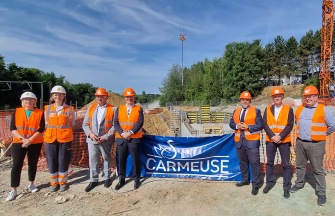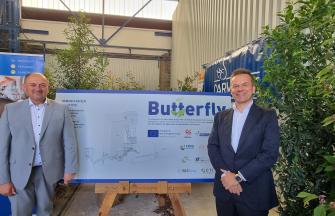Seilles, 30 June 2023. Today, Walloon Minister Willy Borsus, who counts under his attributions, Economy and Research and Innovation, has laid the first foundation stone of the “Butterfly” project, a first of a kind industrial demonstrator of a new type of kiln that concentrates CO2 which is liberated during the lime production process. This concentration is crucial to enable the capture of CO2 and further utilization or sequestration of the CO2. The project is considered a key potential lever to achieve the Carmeuse group decarbonization objective, targeting 30% CO2 reduction in Europe by 2030 and carbon neutrality by 2050.
The project is a demonstrator at industrial scale that intervenes directly in the production process to have a very concentrated CO2 stream (close to 100%) at the end of the kiln stack. Typically, this concentration is, in a normal production process, about 20%. The challenge is to increase the concentration to enable efficient capturing of the CO2 and then allow for CO2 utilization (CCU) or underground sequestration (CCS).
The CO2 emissions from lime production have two sources: about 30 % from combustion (required to generate sufficient heat (close to 1000 °C)) and about 70 % from so-called “process CO2”, which is unavoidable as this CO2 is an inherent part of the decarbonization of the limestone. While switching to renewable energy is a solution for the combustion CO2, it is not a solution for the unavoidable process CO2. That’s why new innovative technologies, such as the one that Carmeuse is developing and testing with this project, and the subsequent utilization/sequestration, are essential to produce carbon neutral lime.
This project is a collaboration between Carmeuse, CRM Group, University of Liège, CTI, EBC, CORETEC, VOC Sens and the University of Mons and has received funding support by the Walloon Government and the European Union.
This industrial demonstrator will be operational in 2024 and then be used for technological testing.
If the results are satisfactory, this technology will be deployed in different Carmeuse lime production plants around the world allowing production of carbon neutral lime.
For Sébastien Dossogne, Chief Executive Officer of Carmeuse, “This project is a very important step in our decarbonization roadmap, which aims for carbon neutrality by 2050 for all of our operations worldwide and 30% reduction in CO2 emissions in Europe by 2030. The lime production process is such that we need technological innovations to capture and store the unavoidable process CO2. I am proud of the work developed by our innovation team so far and grateful for the support of the Walloon government and the EU in making this exciting project a reality. And not to forget the continuous support of the local authorities”.
Minister Willy Borsus: “I’m very pleased that a Walloon champion such as Carmeuse is investing heavily in Research and Development on carbon capture and storage and especially that this project is implemented in Wallonia. It shows that Wallonia can become a world leader in decarbonization technology. “


